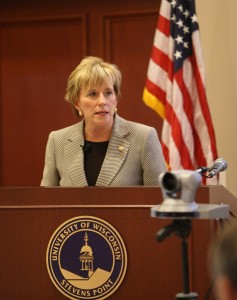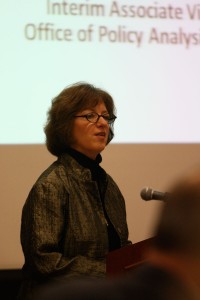STEVENS POINT, Wis. – The University of Wisconsin-Stevens Point is vitally connected to the future of central Wisconsin and the rest of the state, said UW-Stevens Point Chancellor Linda Bunnell, in welcoming the UW System Board of Regents on campus Thursday.
Outlining their vision of “Leading from the Center,” Bunnell said, “We are committed to serve the entire region’s needs and the state, and even the world in the unique asset we have developed.”
UW-Stevens Point offers many programs to educate top-notch professionals who in turn make their careers right in the region, Bunnell said. “From our work in biofuels as we develop the Wisconsin Institute for Sustainable Technology, to our new Geographic Information Systems Center, to our Northern Aquaculture Research Station, we remain on the leading edge of applied research relevant to Central Wisconsin.”
Local business and community leaders, appearing in a series of videotaped testimonials, echoed Bunnell’s enthusiasm for the university’s efforts to meet the evolving challenges of the central Wisconsin economy.
“We are critically dependent on local universities and colleges providing that rich source of employees for us … Without that kind of ongoing process of having that opportunity to recruit well-trained young people into our system, we wouldn’t have enjoyed the growth that we’ve enjoyed up to this point in time,” said Karl Ulrich, CEO of Marshfield Clinic.
Ruder Ware attorney Bill Tehan, president of CENTERGY (Central Wisconsin Alliance for Economic Development), said the university serves an essential role in developing a highly skilled regional workforce.
“Many of the members of our workforce, they are incumbent workers, they are people who need training and retraining, and that sort of activity and education service we believe is best provided within the region,” Tehan said. “UWSP as a strong education provider in the region is really vital to us to making sure that all the industries and industry sectors that we have here in Central Wisconsin are going to have the resources they need in the years to come to really be successful.”
Tom Howatt, president and CEO of Wausau Paper, agreed, adding that UWSP graduates often bring more than technical astuteness to the workforce. “Given the difficult environment we’ve had in the paper industry in recent years, we operate on a relatively lean basis, and so having individuals who come in, even as fresh graduates, ready to contribute from day one, is absolutely critical to our success,” Howatt said.
Dwight Davis, president of Greenheck Fan Corp., Schofield, Wis., also applauded the university’s collaborative spirit in addressing regional challenges.
“The university has come to us and really helped us design curriculums that are specific to our needs,” Davis said.
Bunnell said the university is actively seeking to grow its enrollment, and that today’s student body has more academic talent and diversity than ever before.
She added, however, that “our work is cut out for us if we consider the high percentages in our counties of adults with only high school degrees. This gets to the heart of Advantage Wisconsin, and illustrates our need for resources to help raise the education levels in Central and also Northern Wisconsin.”
UW Regents focus on accountability
After announcing last year that all 13 of Wisconsin’s four-year campuses would participate in a national initiative to publish standardized college performance data, the Regents got a first-hand look Thursday at how the program is being put into action.
As part of the UW System’s participation in the Voluntary System of Accountability, or VSA, the 13 campuses now provide comparable information on the characteristics of each institution and its students on the web-based College Portrait (collegeportraits.org). The College Portrait sites provide consistent and comparable information on each institution’s students, cost of attendance, student engagement with the learning process, and survey data on core educational outcomes.
“This national effort is just one more way in which we are demonstrating our commitment in Wisconsin to being accountable to students, parents, and taxpayers,” Reilly said.
Shari Ellertson, who coordinated the VSA effort at UW-Stevens Point, showed the Board how that university’s College Portrait website works in practice. Visitors to the site could learn, for example, that among UWSP seniors, 92% rated their entire educational experience as good or excellent and 88% said they would attend the campus again; 96% worked with classmates on assignments outside of class; and 96% say that UW-Stevens Point faculty members provided prompt feedback on academic performance.
“The College Portrait offers a more complete picture of what happens to a student after they enroll in college,” said Ellertson, noting that that available information includes classroom environment, housing, financial aid, how to get involved, and campus safety measures.
She also pointed out the many opportunities campuses have to customize the information posted.
As well as addressing the larger issue of accountability, the College Portrait is a valuable tool in providing accessible, usable information on learning experiences and measurable outcomes, Reilly said. “It’s balancing the two goals of having comparable, analyzable data with ‘what am I interested in as a student,’ because this is all about matching a student and campuses,” Reilly said.
“Best of all, the standardized format makes it easy for our customers to make better, more informed decisions about their educational options, based on an apples-to-apples comparison,” said Mark Bradley, president of the UW System Board of Regents.
The VSA project is a partnership between the American Association of on State Colleges and Universities and the National Association of State Universities and Land-Grant Colleges, funded by a grant from the Lumina Foundation. Reilly said that UW System is working with the partners to allow for future participation by the 13 two-year UW Colleges.
The Board of Regents also learned Thursday about efforts to refine and reformat the university’s annual Accountability Report, which it has been publishing each year since 1993.
To better reflect the Advantage Wisconsin framework and its seven core strategies, the upcoming report, which is scheduled for publication in May 2009, will include several new performance indicators that reflect the UW System’s focus on generating more degree-holders, more jobs and stronger communities.
Sharon Wilhelm, the UW System interim associate vice president for policy analysis and research, reported that some of the new indicators might include, for example, increased tracking of access relative to race and ethnicity; degrees conferred in high-need/leading-edge fields; and student civic participation and community outreach and education.
View presentation on
Education Committee
UW-Stevens Point Presentation:
UW-Stevens Point Provost Mark Nook opened the committee session with a presentation on the university’s academic plan, highlighting the ways in which UWSP’s academic programming supports the institution’s mission and identity as an economic development leader in central Wisconsin.
UW-Stevens Point is currently engaged in developing a new 10-year academic strategic plan, based on the university’s mission, “Vision 2015,” and its six-year “Leading from the Center” growth agenda, Nook said. The academic plan is being developed to address the seven key areas of Advantage Wisconsin and to address the economic needs of Central Wisconsin as identified in the Centergy report issued by the region’s economic development group.
“ ” focuses on five primary academic initiatives: the Wisconsin Institute for Sustainable Technology (WIST); the expansion of Business and Economics programs; the expansion of Health Sciences; New Media and Software development (including the development of master’s degrees in medical informatics); and expansion of the campus’s international and study abroad program.
Chapters UWS 17 and 18:
Regents also heard an update from the Chapters UWS 17 & 18 Review Committee, which has been working to update and clarify sections of the Wisconsin Administrative Code pertaining to student conduct and all conduct on university lands. The last major revision of these chapters occurred in 1996.
“We received hundreds of suggestions and considered each suggestion we received,” said review committee chair Jane Radue, the UW System assistant director of operations review and audit.
“The Committee obviously had quite a balancing act to perform in the effort to balance the needs and rights of the students, with the need to ensure safety, security, and adherence to the characteristics of each campus community and mission,” said Regent Danae Davis.
The intent is for the revised and updated administrative rules to be easier to use and understand for students, university officials and the public. The recommended revisions to Chapter UWS 17 focus on: (1) maintaining a safe and secure campus environment; (2) ensuring procedural fairness for students; and (3) addressing student nonacademic misconduct through an educational disciplinary process.
The recommended revisions to Chapter UWS 18 are also based on maintaining a safe and secure campus environment; they provide organizational, technical, and practical improvements.
Chapter 17 now includes a new format that more clearly outlines the type of misconduct that may be subject to university discipline, as well as specific descriptions of sanctions that may be imposed. Overall, the proposed changes are designed to make the disciplinary process more educational and less adversarial.
UW-Madison Assistant Police Chief Dale Burke, who served on the review committee, noted that part of the goal is to allay any potential misunderstandings. “We’re not trying to sneak up on someone or catch them by surprise,” Burke said. “We want people to know, up front and ahead of time, what the expectation is.”
The proposed revisions make clear that university discipline may be applied to off-campus conduct, if the conduct meets a two-part test. First, the kind of misconduct must be described in chapter 17.09. Second, the off-campus conduct must affect a substantial university interest, as described in the proposed rules. There is no requirement for university campuses to impose such discipline.
Regarding Chapter 18, Regent Kevin Opgenorth spoke about a non-binding referendum approved by UW-Platteville students to enact a campus-wide smoking ban, but discovered that it may not be allowed under state law. He asked if revisions to Chapter 18 would allow a campus to enact such a policy, and suggested that chancellors be authorized to sanction people who do not abide by such policies.
General Counsel Pat Brady noted that campuses do have the authority to prohibit smoking in buildings and near entrances, but state law does not allow campuses to regulate smoking in general outdoor areas. Nonetheless, a campus could enact a general statement that expressed its desire to be smoke free.
Addressing concerns about the university extending its disciplinary reach to include off-campus behavior, UW-Milwaukee Chancellor Carlos Santiago commented that it’s increasingly difficult to tell where campus boundaries begin and end. He also described multiple steps that his institution has taken to keep local neighborhoods secure.
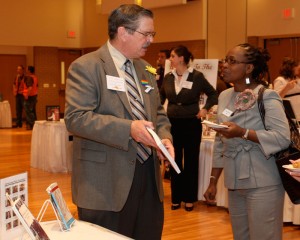
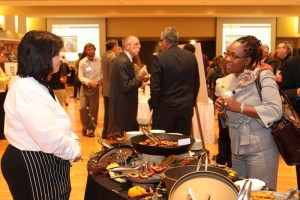
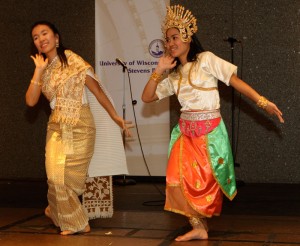
Regents and other guests had the opportunity to meet UW-Stevens Point students, faculty and staff, to learn more about unique academic programs and campus projects.
“We hold our students to a higher standard,” Santiago said. “When police aren’t able to follow up on a citation, we believe it’s our obligation to look into that. If we determine that it’s egregious behavior, we’ll take action.”
Regent Mike Spector moved to amend the proposed rule 17.14, eliminating the possibility that students could appeal to the Board of Regents after being suspended or expelled from a specific academic program. Even under the amended rule, students would still be able to appeal a suspension or expulsion from the campus. That motion to amend was passed.
Regent Colleene Thomas wondered to what extent feedback received in the spring could affect changes to the proposed wording. Brady responded that the Board still has authority to make changes after receiving public and legislative council feedback.
Regent Tom Loftus, the only Regent to vote against approving the proposed revisions, commented, “One can only imagine what would have happened during the Vietnam War, when students were involved in civil disobedience. We didn’t have a lot of enlightened police officers then.”
The Committee moved to recommend to the full Board that the draft rule revisions be forwarded to the Wisconsin Legislative Council for a review of form, style, and technical adequacy, as the next step in the rulemaking process. After any necessary revisions, the Board of Regents will hold a public hearing on the draft rules, approve a final draft, and submit the rules to the Legislature, with the goal of having new rules in place by September 2009. The Legislature may elect to hold additional public hearings during this later phase.
In other business, the Education Committee:
- Heard an update on the expansion of the UW-Madison Connections program, which is geared to allow more Wisconsin residents to complete their baccalaureate degrees at UW-Madison after beginning their educations at other Wisconsin institutions, both two-year and four-year.
- Heard a report from Senior Vice President Rebecca Martin, including an update on Waukesha County’s higher education needs.
- Reviewed a proposed timeline for Plan 2008 reporting and Inclusive Excellence, the umbrella under which the UW System’s diversity work will move forward following Plan 2008. The final report will be presented at the March 2009 Board meeting.
- The Committee also approved the reappointments of Philip Farrell, David Kindig, and Gregory Nycz to the Oversight and Advisory Committee of the Wisconsin Partnership Program.
Business, Finance and Audit Committee
UW-Stevens Point Vice Chancellor for Business Affairs Greg Diemer provided the Committee with the university’s Safety and Security Update. He gave an overview of some measures UWSP has taken to ensure campus safety, including adding additional police officers and counselors, upgrading communication systems, arming of police officers, and providing educational sessions for faculty. The $150,000 cost was reallocated from other internal operations.
The committee also viewed a 12-minute video on “Preparing and developing a ‘survival mindset’” that is being used to educate members of campus about what to do in the event of a campus shooting incident.
Amid general committee approval of UWSP’s efforts, Regent Michael Falbo noted, “I wonder what’s happening on other campuses? It still worries me that we don’t have a coordinated effort.”
In other business, the Business, Finance and Audit Committee:
- Heard an update on 2008 proxy season voting results relating to trust funds. According to the report, there were 373 proposals filed related to social issues, only about half of which came to votes. Through the end of June, 184 social issue proposals resulted in shareholder votes, 129 were withdrawn, and 60 were allowed to be omitted by the Securities Exchange Commission.
- Heard an update from UW System Trust Funds Director Doug Hoerr on real estate investments related to the University;
- Accepted eight bequests with a total value of $2.8 million;
- Approved goals and targets for the 2009-11 biennial budget performance measures; including targeted enrollment growth of 4,081 FTE over Fall 2007 enrollments, a retention rate of 82%, an overall UW System graduation rate of 65%, and continuing to increase the contribution made to the Wisconsin economy each year. Freda Harris noted that while the performance measures haven’t changed, the goals for graduation rates and contribution rates have both been slightly adjusted upward to reflect that previously set goals in those measures have been exceeded.
- Discussed the primary responsibilities typically assumed by Business, Finance and Audit Committees in higher education. As presented by UW System Senior Vice President for Administration and Fiscal Affairs Thomas Anderes, these responsibilities include establishing financial controls and managing risk, managing an open budget process, developing tuition policies and rates, connecting capital project planning and debt financing decisions, and ensuring that an active and transparent audit process is in place.
- Heard an update on the quarterly gifts, grants and contracts for the 4th quarter. Vice President Deborah Durcan told the Committee that total gift, grant and contract awards for the fiscal year that ended June 30, 2008, were $1.2 billion, a decrease of $83.2 million from the previous year. Federal awards decreased $47.5 million while non-federal awards decreased $35.7 million. Significant decreases in research awards and gift funding for large capital projects at UW-Madison were the primary drivers of the drop in awards.
Capital Planning and Budget Committee
UW System Associate Vice President David Miller provided the committee with the UW System 2009-15 Physical Development Plan, which represents the capital budget priorities for the 15 UW System institutions for the next three biennia. Developing a Systemwide long-range plan allows the UW institutions, the Board of Regents, the Department of Administration, the Legislature, and other policy makers to better understand and manage the facility needs of the educational institutions, Miller said.
In other business, the Capital Planning and Budget Committee:
- Heard from UW Colleges Vice Chancellor Steve Wildeck that counties and local municipalities contribute about $7.9 million annually for financial support of UW Colleges.
- Approved authority for UW-Stevens Point to adjust the budget of the Waste Management Center project. The project will construct the first waste management facility of its kind built at a technical college or university in Wisconsin and will feature a pilot wastewater treatment plant, a composting lab, a microbiology lab, and an adjoined recycling center offering co-training opportunities in materials recycling. The project was originally enumerated by the State Building Commission with a smaller budget and with the direction to construct the facility as a pre-engineered metal building. The project designers later concluded that a metal building was unsuitable for the academic purpose of the building and provided a design for a more appropriate masonry facility;
- Approved the design report for UW-Stout to adjust the project budget and to construct the Hovlid Hall renovation and addition project;
- Approved authority for UW System Administration to construct seven maintenance and repair projects through the All Agency program at four different institutions. One of these is the UW-Madison Walnut St. Heating Plant Chiller Replacements project, which will replace two steam-driven chillers with two new electric chillers, and increase the chilled water capacity of the Walnut St. Heating Plant from 18,000 tons to 23,000 tons. The debt service for this project will be paid from the annual energy cost savings from the fuel and utilities appropriation;
- Approved authority for UW-Whitewater to construct the Vansteenderen Softball Complex bleachers portion of the Multi-Sport Phase III project as a separate project, and;
- Heard a report from Associate Vice President David Miller on building commission actions, including the Building Commission’s approval in September of about $71 million for projects. The funding breakdown for those projects is $4 million General Fund Supported Borrowing, $14 million Program Revenue, and $53 million Gift and Grant Funds.
Photo Credit:Tom Charlesworth
###
The Board of Regents will resume its October 2008 meeting on Friday, October 3, at 9 a.m.
in the Alumni Room of the Dreyfus University Center
Related: Read October 3 (day 2) news summary

